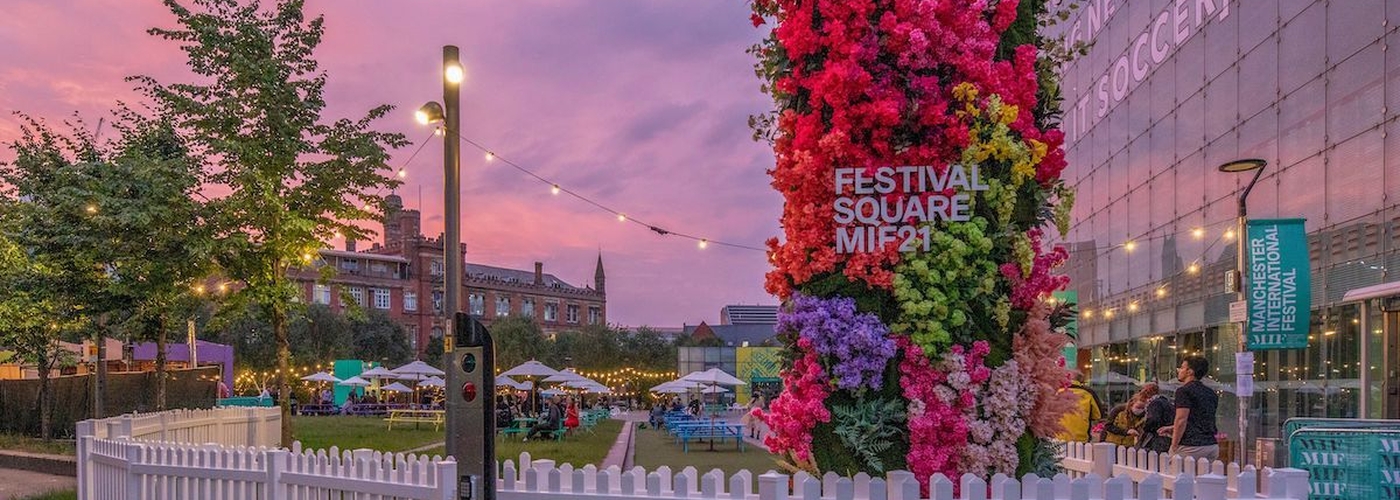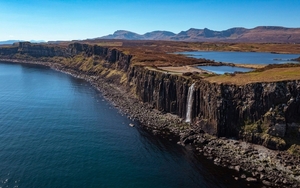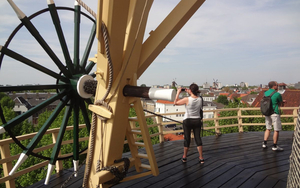We speak to the people bringing local communities closer to the festival
Manchester International Festival (MIF) is a bit different this year.
Not just because of the obvious. Instead, MIF21 will be a landmark festival due to its efforts to bring local communities closer to the action. Sure, Damon Albarn is on the advertising and so is Arlo Parks, but there are a lot of people on the flags and advertising you probably don’t recognise.
This year the festival has hired six neighbourhood organisers from across Manchester (Rochdale, North Manchester, Whalley Range, Wythenshawe, Tameside and Salford) with funding from the Esmée Fairburn Trust, to get their respective communities involved in the festival, bringing it closer to people it might have missed in the past.
I think everyone in Salford knows what MIF is now, so I’ve done my part
Breaking down barriers
Keri Muldoon is full of energy when I talk to her over the phone about MIF. The community organiser for Salford, Keri and her vivid pink highlights can be seen on posters and flags throughout the city. She still can’t believe she’s on them and finds the whole thing hilarious. Keri’s happy to admit she wasn’t fully aware of MIF before this year. Now she says she’s obsessed.
“MIF have done well getting me because I’m everywhere,” she says. “I think everyone in Salford knows what MIF is now, so I’ve done my part. I’ve always done community stuff but working with an organisation the size of MIF, that’s a massive thing for me with the resources they have. It’s blown me out of the water. It’s massive, it’s international.”
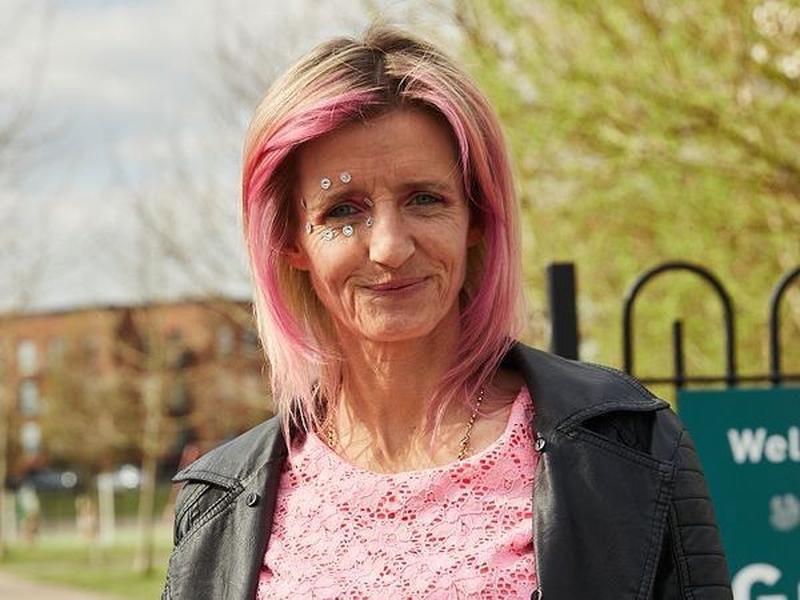
Keri is heavily involved in her community and giving people opportunities is at the centre of everything she does whether that’s putting on youth clubs or her role in a local housing association.
Key to Keri’s approach has been trying to change perceptions of what art is and who it’s for. “I know there’s a lot of people in this area that don’t have much money and there’s a lot of people who’ve never been to the theatre or don’t know what contemporary art means,” she says.
“It’s about showing the kids in the schools that there is something out there for them. Something to aspire to. I think sometimes when you get some of these shows, the wording isn’t right, for people like us it comes across as too high class. It’s about breaking that barrier.”
The completion of The Factory, or “the fun factory” as Keri affectionately refers to it, is another project in which she sees endless potential for her community. The monolithic creative space on the banks of the Irwell (chalked for completion by December 2022) will host a variety of arts events from exhibitions to theatre and live music. It will create up to 1400 fully-funded skills and training places, particularly aimed at young people, providing entry into the creative industries.
The space will also support up to 1500 jobs as well as reaching up to 10,000 young people in the region through digital learning and engagement opportunities.
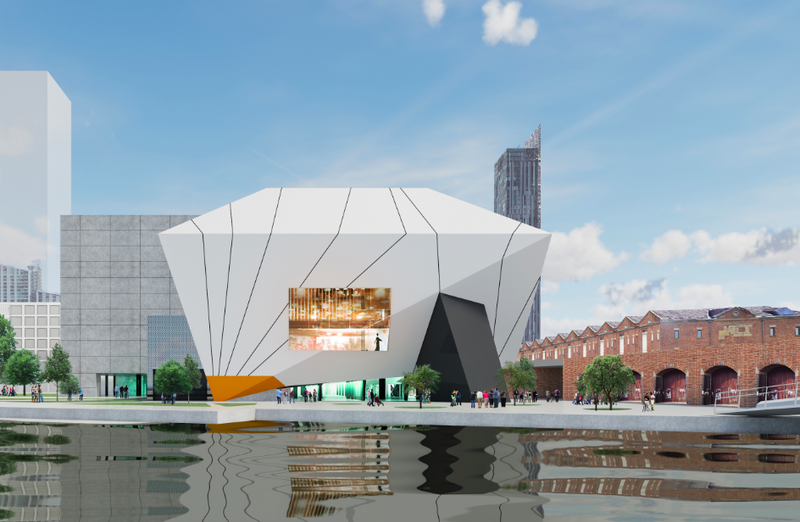
Hidden communities
Elsewhere, MIF has been an opportunity for community organisers to discover parts of their own community that they were unaware of. Ali Davenport, the community organiser for Wythenshawe speaks proudly of the work the festival has done with a group that’s been largely hidden.
“One of this year’s Creative Fellows, Audrey Albert, has been doing work with the Chagossian community in Wythenshawe, a community I’d not heard of before. This is a group of people who back in the late 60s were evicted from the Chagos Islands by the British government to make way for a military base. These people were uprooted, had to leave everything at short notice and some came to the UK,” Ali says.
“Audrey’s a photographer and she’s been doing work relating to her grandparents who’re from the Chagos Islands, celebrating the culture and capturing it for generations to come. We’re looking at doing a community visit to Central Library to see I Love You Too but also to look at the archives and then hopefully find a way for people’s memories, stories and artefacts to be preserved.”
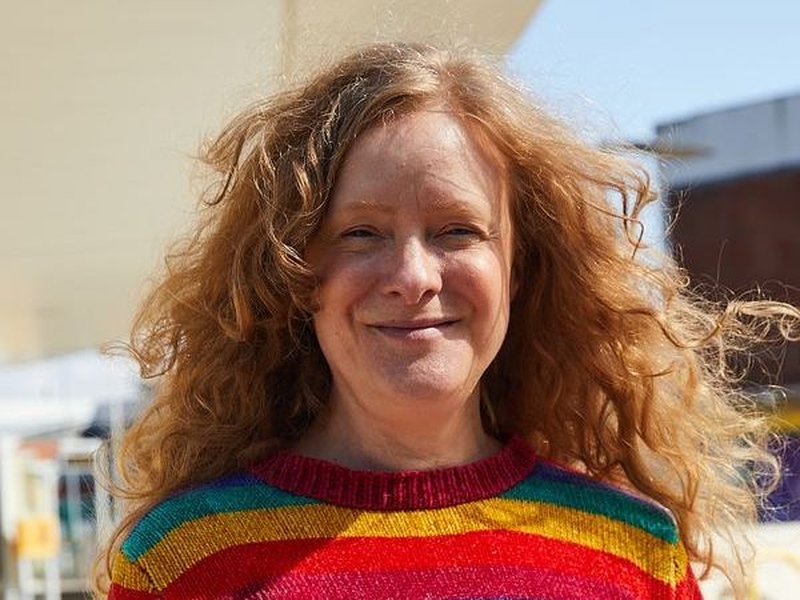
All six of the community organisers have been tasked with picking a performer and introducing them on stage at Festival Square. They’ve held workshops encouraging local residents to get actively involved in many of the festival’s works from Sea Change to I Love You Too.
Free tickets to events have been given to organisers for the respective communities but the festival is also providing transport to ensure everyone can attend. Volunteers at the festival are reimbursed for their expenses to ensure a diverse slice of society can get involved.
Art isn’t a la-di-da thing, it’s for everyone
Tameside organiser Dale Coleridge, who runs his own dance studio in Ashton, has experienced the benefits of the festival first-hand. “MIF has been one of those platforms that has let me achieve everything I wanted to achieve,” he says. In 2013, Dale was walking past Mayfield Depot with some mates when a volunteer asked them if they wanted to watch a dance show. Despite studying dance in the city he had never heard of MIF.
“I came out and I just thought that’s the most crazy, bizarre thing I’ve ever seen in my life,” he says.
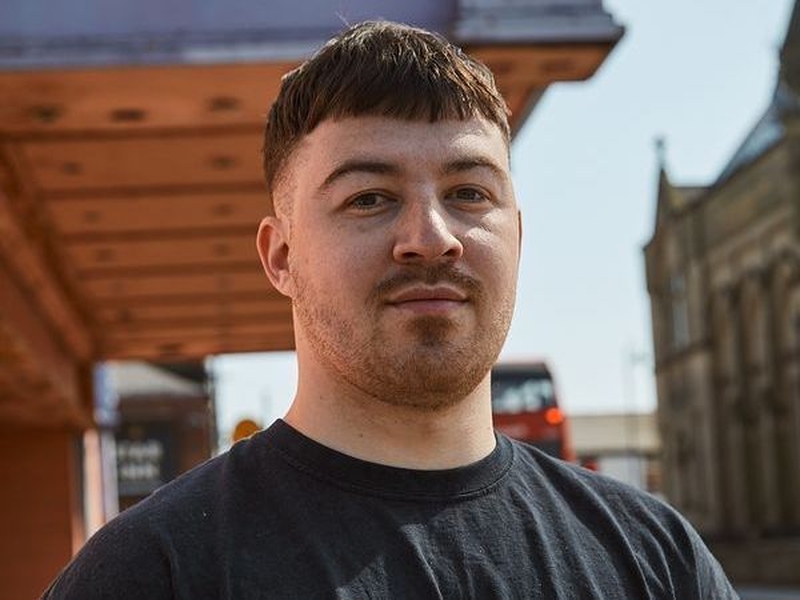
A year later Dale was auditioning for a MIF performance that after debuting in Manchester would take him around the world with shows as far away as New York and Iceland. “I grew up on a council estate. I’ve learned my trade whilst living on a council estate. I’m still on a council estate. These are my experiences and I’m trying to give back that same eye-opener to my community,” he says.
“A lot of people see it as this la-di-da thing that they can’t engage with. For me, it’s about breaking that boundary and saying no, art is for everyone. This year MIF have made an effort to say this is your festival. They’re giving it back to Manchester residents. This is your festival. Take it back from us.”
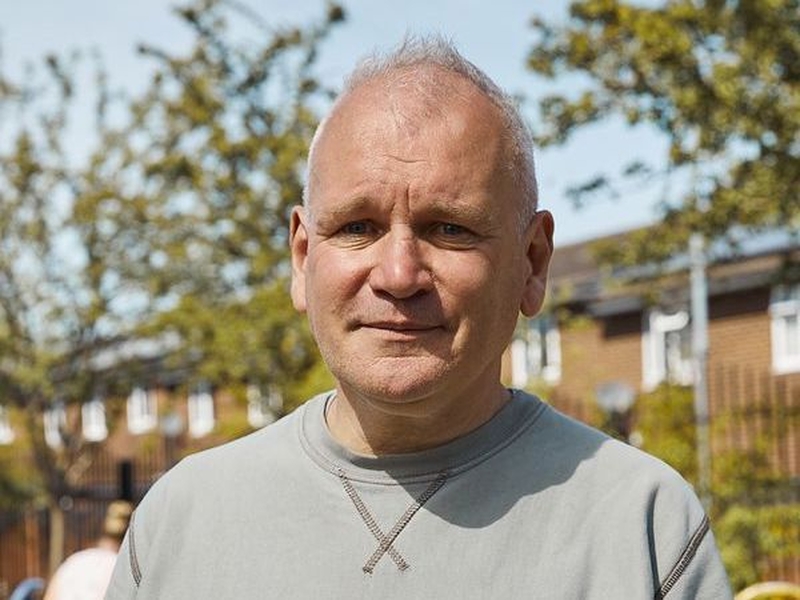
This feeling is echoed in all of the conversations I have with the organisers. How to encourage involvement without patronising people. How to stress a level of inclusivity that is difficult when art so often carries an air of elitism.
David Kaye, the community organiser for North Manchester says, “We’re about a 40-minute walk from the city centre but there are still people who don’t feel connected to the city centre. It’s about saying to people: this is your city, this is what’s going on, get involved.”
“Once they go along to something they might really enjoy it or say that’s not for me. At least they’ve tried something. That’s what it’s all about, whether it’s a community centre or a library, just getting someone through the doors is often the biggest hurdle. Once they are there they realise there’s stuff they like.”
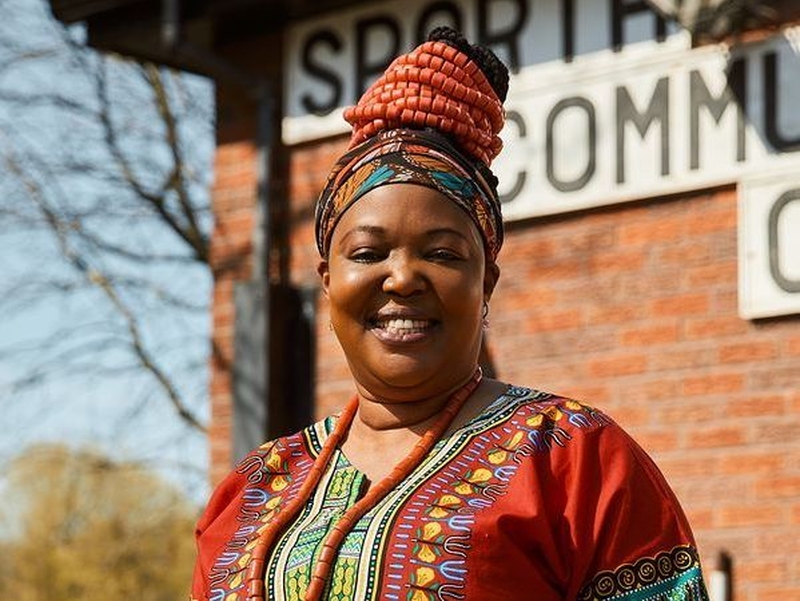
All roads lead to Festival Square
When asked about what the community organisers and their respective communities are most looking forward to, the responses span the two-week line-up. All are excited to introduce and watch the acts from their own communities at Festival Square. Some single out particular events.
Nicky Iginla, the community organiser for Rochdale, singles out The Walk as something particularly pertinent to members of her community.
“It’s about a nine-year-old refugee girl [in 3.5-metre tall puppet form] who’s been walking from the Syria-Turkey border to Manchester. A lot of the refugees I work with are excited about that because it’s a part of what they’re going through. I’ve been working with refugees and people who have settled in Rochdale from other countries and a lot of them are getting involved in volunteering. Lots of them are getting involved in the creative side of things which they wouldn’t have dreamt of doing before.”
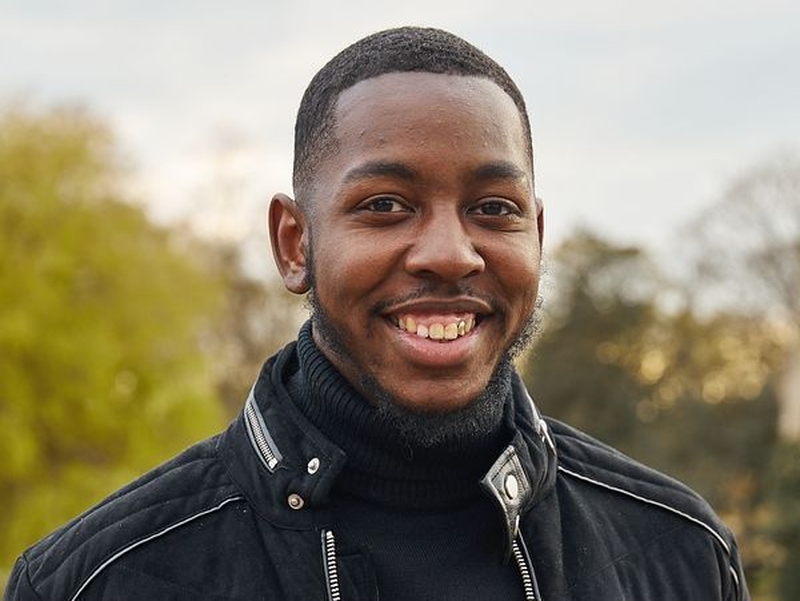
For Akeim Mundell BEM organiser for Whalley Range, all roads lead to Festival Square. “I attended Festival Square two years ago and it felt like a special opportunity because the events managed to get me and my family together. We’re quite a large family who often don’t have the chance to talk and have a laugh together but going to Festival Square gave us the chance to socialise and spend time together.”
This experience reinforced Akeim’s commitment to getting involved. He says that the community organiser initiative has given him the chance to spread awareness of the festival and the opportunities available have filtered down through word of mouth.
“People are attending events and being a part of creative commissions that they ordinarily wouldn’t,” he says. As for this year, Akeim is keen to start where he and his family left off. “We’re looking forward to being able to watch the local performances, to let our hair down, have a drink, have some food. Everyone’s always like Festival Square, Festival Square. To be able to go into such an environment after the year we’ve had is a dream come true.”
Follow Davey on Twitter: @dbretteats





